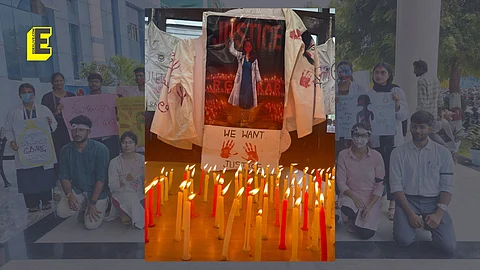

Nine days after someone brutally raped and murdered a trainee doctor at RG Kar Medical College and Hospital in Kolkata, the Supreme Court took suo moto cognisance of the case and began hearings. During the proceedings, the court urged the protesting doctors to resume their duties and simultaneously set up a National Task Force (NTF) to explore measures for protecting healthcare professionals in their line of duty.
However, in the weeks following the trainee doctor's death, several instances of violence against healthcare workers surfaced across the country.
In one such case, a nurse from Uttarakhand was raped, murdered, and discarded in a vacant plot in Uttar Pradesh.
In Kolkata, another individual threatened a female doctor with the words, "I will do to you what they did to the female doctor in RG Kar."
In Mumbai, a drunk patient and their relatives assaulted a female resident doctor at Sion Hospital while someone else threatened another female doctor, warning they would set her clinic ablaze.
In Delhi, police arrested a patient's relative for abusing and assaulting doctors at a clinic.
These incidents, occurring in the wake of the RG Kar tragedy, raise critical questions about the safety of healthcare workers. As violence escalates, we must ask: On what grounds does the Supreme Court order doctors to return to work in increasingly unsafe environments?
While violence against doctors is pervasive, we must recognise that the RG Kar incident is not solely about violence against healthcare workers; it is a harrowing example of violence against women. The public's outcry against this heinous crime has been substantial, but disturbingly, it has also triggered a wave of misogynistic threats and actions.
In Nagpur, an auto driver threatened young girls, saying, "I will rape you like the Kolkata doctor”, before a crowd beat him up.
The Quint reported that individuals searched for the Kolkata doctor's rape video on porn sites.
Additionally, dark-humour memes and jokes about her alleged gang rape have circulated online.
As protests demand the death penalty for rapists and instant street justice, we must consider the implications of such measures.
The death penalty for rape has not resulted in the number of rape cases in India going down.
According to NCRB data, India records 86 cases of rape every day and 49 cases of crimes against women every hour, with 96% of rapes committed by individuals known to the victim.
The push for harsher penalties may inadvertently lead to underreporting, as victims often hesitate to condemn someone they know to death. Stricter laws have also contributed to a decrease in convictions, as judges may hesitate to impose the death penalty unless absolutely necessary.
As Dr Sylvia Karpagam pointed out in a tweet, "It is important to understand that the men who rape are the same men who lynch."
The demand for street justice may provide temporary satisfaction, but it distracts from addressing the root causes of violence against women and healthcare workers.
All of us — including the judiciary and the masses — seem to be trying to alleviate the discomfort that has arisen from witnessing not just an inhumane act of violence but also the disturbing reactions it has generated.
These reactions are symptoms of the deep rot of misogyny and the culture of female dehumanisation that pervades our society.
Do we empower and encourage men to commit crimes against women? The answer is an unequivocal yes. And these instant solutions that aim to remove the discomfort are not the answer.
We must sit with our discomfort, and only then will change come — all of us, healthcare workers, Supreme Court judges, and the public alike.
(Dr Christianez Ratna Kiruba is a 29-year-old internal medicine doctor, freelance health journalist and Deputy Editor at Nivarana, India's first public health digital platform. She is an intersectional feminist and part of the LGBTQIA community. She is interested in viewing public health issues through the gender lens.)
